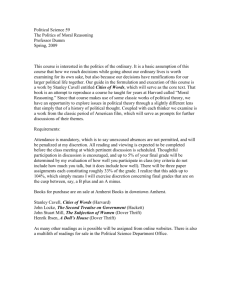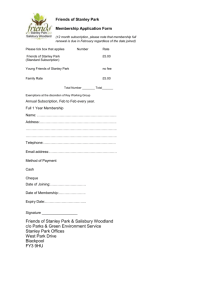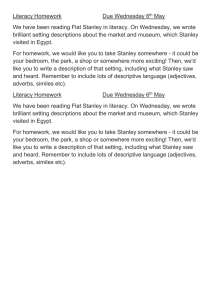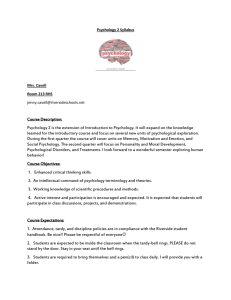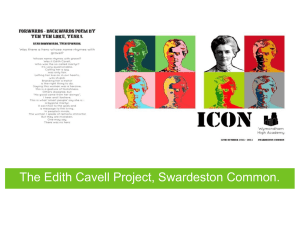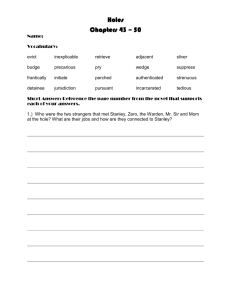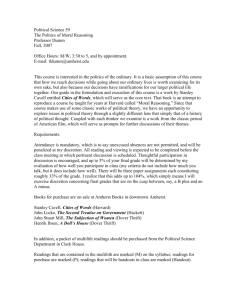Syllabus - The Department of Philosophy
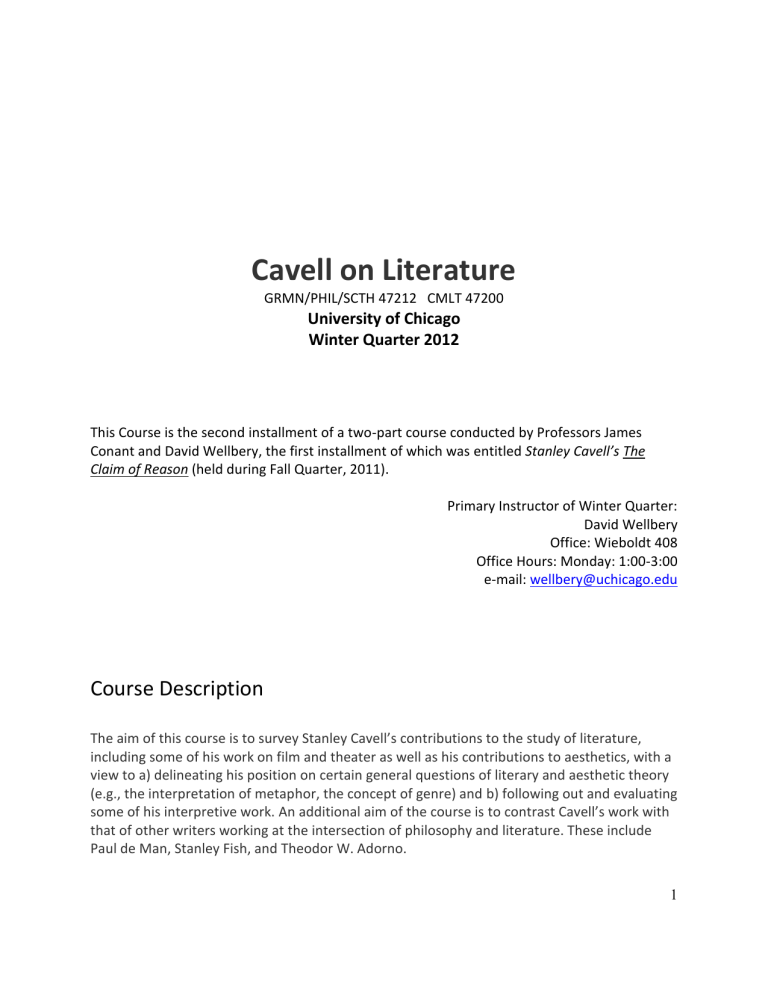
Cavell on Literature
GRMN/PHIL/SCTH 47212 CMLT 47200
University of Chicago
Winter Quarter 2012
This Course is the second installment of a two-part course conducted by Professors James
Conant and David Wellbery, the first installment of which was entitled Stanley Cavell’s The
Claim of Reason (held during Fall Quarter, 2011).
Primary Instructor of Winter Quarter:
David Wellbery
Office: Wieboldt 408
Office Hours: Monday: 1:00-3:00 e-mail: wellbery@uchicago.edu
Course Description
The aim of this course is to survey Stanley Cavell’s contributions to the study of literature, including some of his work on film and theater as well as his contributions to aesthetics, with a view to a) delineating his position on certain general questions of literary and aesthetic theory
(e.g., the interpretation of metaphor, the concept of genre) and b) following out and evaluating some of his interpretive work. An additional aim of the course is to contrast Cavell’s work with that of other writers working at the intersection of philosophy and literature. These include
Paul de Man, Stanley Fish, and Theodor W. Adorno.
1
Required Texts
The following books have been ordered through the Seminary Co-op and are all required texts for the course:
Stanley Cavell:
Disowning Knowledge in Seven Plays of Shakespeare, Harvard UP 2003, ISBN 0 521
52920 4
The Senses of Walden, University of Chicago Press 1992, ISBN 0-226-09813-3
Must We Mean What We Say, Cambridge UP 2002, ISBN 978-0-521-52919
Pursuits of Happiness, Harvard UP 1981, ISBN 0-674-73906-X
The World Viewed, Harvard UP 1979, ISBN 0-674-96196-X
William Shakespeare:
King Lear, The Arden Shakespeare, ISBN978-1-903436-59-2
Additional Readings
All of the other readings for the course will be made available through the Chalk site of the course. (If you ever encounter any problem obtaining an assigned reading for the course, you should immediately contact the instructor by e-mail and let him know about the problem.)
Readings posted on the Chalk site for the course, but not listed on the syllabus below, are optional readings that have been posted because they bear on possible paper topics or because they address issues of interest to the course.
Structure of the Course, Requirements and Related Issues
Meeting Times: The course will meet all ten of the eleven weeks of the quarter on Wednesdays from 3:00 to
5:50pm in Wieboldt 408.
Undergraduates: This course is open only to selected undergraduates who can show that they have the appropriate background and only then with the special permission of the instructor.
Graduate Students: This course is open to all graduate students in Philosophy, Social Thought, Germanic
Studies, and Comparative Literature. Graduate students from other departments/programs who have a special interest in the topic are likewise welcome.
Auditors: Faculty and Graduate Student auditors with a serious interest in the topic are welcome to participate in the seminar.
2
Announcements: There is a Chalk website for this course (chalk.uchicago.edu). Announcements (modifications to the syllabus, etc.) will be posted there. Students are expected to keep abreast of these. Additional readings will also be assigned that are not presently on the syllabus and those readings will be made available through the Chalk site.
Format: The format will combine presentations by faculty (and, in some cases, students) and discussion.
Work for the course: All students are expected to attend class regularly, to be conversant with the required readings, and to be ready to participate in discussion.
Final paper: Students taking the course for credit are expected write a term paper at the end of the quarter, due on the Friday of 11 th week (March 16, 2012). Final papers received by the instructor in a timely fashion will be graded immediately. Both a hard copy (to his departmental mailbox) and an electronic copy (to his email address) of your paper should be submitted to Professor Wellbery. The final paper is the only official requirement for the course. It may be on any topic of your choice pertaining to themes covered in the seminar. It should be between 15 and 30 pages.
Policy on extensions for the final paper: Students may hand in their final papers after the official due date and still receive credit for the course only if they have secured permission from the instructor(s) to do so. Any student granted an extension should also be aware of the following: such papers will not be graded immediately upon receipt. The later the paper, the less promptly it will be graded.
Special option for students taking both Cavell courses for credit: Students who plan to enroll for credit in both of the courses that make up the two-part sequence of courses on Cavell to be taught by Professors
Conant and Wellbery have the option of receiving credit for both courses at once by writing a single double-length paper. Students who choose to exercise this option should hand in their paper in both electronic and hard copy form to both professors. The official due date for such papers is the same as that indicated above: March 16, 2011.
Students taking only one of the two courses for credit: Students who wish to take only one part of the two-course sequence on Cavell for credit are equally free to enroll in either one of the two courses for credit. Such students are welcome, indeed encouraged, but in no way required, to audit the other half of the sequence.
Conference
In conjunction with the paired courses on Cavell, a conference entitled:
On Cavell:
Aesthetic Criticism in Modernity
will be held at the University of Chicago from March 2-4, 2012. The conference will be based on pre-distributed papers that will be made available to class participants (and other interested parties) well in advance of the conference. Participants in the conference will be:
Sarah Beckwith (English, Duke)
James Conant (Philosophy, University of Chicago)
Michael Fried (Humanities Center/Art History, Johns Hopkins University)
3
Arata Hamawaki (Philosophy, Auburn)
John Harbison (Music, MIT)
Andrew Klevan (Film Studies, Oxford)
Christoph König (Literature and Germanic Studies, Universität Osnabrück)
Toril Moi (Literature and Romance Studies, Duke University)
Richard Moran (Philosophy, Harvard University)
Yi-Ping Ong (The Humanities Center, Johns Hopkins University)
Robert Pippin (Philosophy, Committee on Social Thought, University of Chicago)
David Wellbery (German and Comparative Literature, Committee on Social Thought,
University of Chicago)
Lecture
On January 19, 2012 at 4:30 a lecture will be held by David Schalkwyck of the Folger
Shakespeare Library entitled XXXXX. This lecture is highly recommended to participants in this class.
Schedule of Meetings, Topics and Readings
First Meeting (Wednesday, January 4): Introductory Meeting
Topics to be covered in the first meeting:
Overview of the structure of the course
Survey of themes to be covered in the course
Note: No assigned reading for the first meeting.
Second Meeting (Wednesday, January 11): Cavell on Criticism, Fraudulence, Intention,
Aesthetic Modernity
Required reading:
Stanley Cavell, “Aesthetic Problems of Modern Philosophy,” Must We Mean What We Say, pp.
73-97.
Stanley Cavell, “Music Discomposed,” Must We Mean What We Say, pp. 180-213.
Stanley Cavell, “A Matter of Meaning It,” Must We Mean What We Say, pp. 213-238.
Recommended Reading:
Stanley Cavell, “Austin at Criticism,” Must We Mean What We Say, pp. 97-115.
4
Third Meeting (Wednesday, January 18): Confrontation I: On Figural Language, Literary
Meaning, the Ordinary
Required Reading
Stanley Cavell, “Politics as Opposed to What?” Critical Inquiry , Vol. 9, No. 1, The Politics of
Interpretation (Sep., 1982), pp. 157-178. Reprinted in: Themes out of School. Effects and
Causes (Chicago: University of Chicago Press, 1984), pp. 2759 (“The Politics of Interpretation”).
Stanley Fish, “How to do Things with Austin and Searle: Speech Act Theory and Literary
Criticism,” MLN , Vol. 91, No. 5, Centennial Issue: Responsibilities of the Critic (Oct., 1976), pp.
983-1025.
Paul de Man, “Semiology and Rhetoric,” Diacritics, Vol. 3, No. 3 (Autumn, 1973), pp. 27-33.
William Butler Yeats, Among School Children.
Fourth Meeting (Wednesday, January 25): Confrontation II: Reading Beckett
Required reading:
Stanley Cavell, “Ending the Waiting Game. A Reading of Beckett’s Endgame,” Must We Mean
What We Say, pp. 115-163.
Theodor W. Adorno, “Trying to Understand Endgame,” in: The Adorno Reader (London:
Blackwell, 2000), pp. 319-353.
Samuel Beckett, Endgame.
Fifth Meeting (Wednesday, February 1): The Ontology of Film
Required reading:
Stanley Cavell, The World Viewed.
Sixth Meeting (Wednesday, February 8): The Masterpiece
Required reading:
Stanley Cavell, “The Avoidance of Love: A Reading of King Lear, Must We Mean What We Say, pp. 267-357; reprinted in: Disowning Knowledge in Seven Plays of Shakespeare, pp. 39-125.
William Shakespeare, King Lear
Seventh Meeting (Wednesday, February 15): Cavell on Genre
Required Reading
Pursuits of Happiness, “Introduction: Words for a Conversation,” pp. 1-44; Chapters 4 (pp. 133-
160) and 6 (pp. 189-228).
Screenings: It Happened One Night; The Philadelphia Story
Eighth Meeting (Wednesday, February 22): Melodrama
Required Reading
Contesting Tears. The Hollywood Melodrama of the Unknown Woman, Introduction (pp. 3-46),
5
Chapter Five: Stella’s Taste: Reading Stella Dallas
Ninth Meeting (Wednesday, February 29): Thoreau
Required reading:
Stanley Cavell, The Senses of Walden.
Tenth Meeting (Wednesday, March 7):
Required Reading:
Stanley Cavell, “Counter-Philosophy and the Pawn of Voice,” A Pitch of Philosophy.
Autobiographical Exercises, pp. 53-128.
Jacques Derrida, “Signature – Event – Context,” in Margins of Philosophy, pp. 307-330.
6


